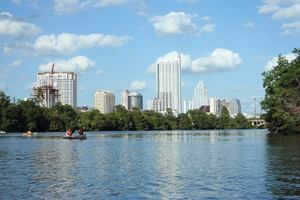MORE INFORMATION
- Top 50 Builders: Weathering the Storm
- The Risk-Takers
- Online Honors
- Branching Out
- The Mainstay
- Keen on Green
- Remodeling Made Simple
- Resilient Retail
The strong have survived with the scars of a historically dismal year in pool construction.
These three builders are taking aggressive action in a tough market.
A handful of Top Builders have taken their Websites to the next level.
These firms have hedged their construction revenue with new business.
Commercial work, though still crucial, is on a downward trend.
Builders are finding ways to be eco-friendly.
Consumers are spending less on renovations.
In-store events, customized showroom layouts and expansion have helped keep some retailers ahead of the curve.
How to tell if a city or area is poised for recovery? What factors help determine whether an economic rebound is imminent?
Experts point to a number of dynamics, including job growth potential, population increase, first-time home-buyers, excess condominium or office space, a vibrant downtown, education levels, early foreclosures and the weather.
On the down side, bubble markets probably won’t see growth again anytime soon.
Taking these issues into account, a handful of metro areas appear well-positioned to shake off the shackles of the current recession. Some of these cities aren’t exactly prime pool markets, but the information provides an overall picture of where growth is likely to occur.
No. 1: Austin, Texas
In May, the Austin metro area added 5,500 jobs — its fourth straight month of job growth, according to theTexas Work Force Commission. Not coincidentally, the city’s unemployment rate then stood at a subdued 5.8 percent, which could explain why Forbes recently ranked Austin as the best big city for jobs.
It’s still affordable to buy a home in Austin — the average cost of a three-bedroom residence is $182,000. Combined with good weather and a trendy, sophisticated population, it’s little wonder the city is adding residents faster than almost anywhere else in the nation.
Positive vibes also stem from an economy that, bolstered by Dell, the University of Texas and the state government, is expected to grow by $5 billion by the end of 2010.
“In terms of the economy and housing, we didn’t see a drop-off here like they did in other parts of the country,” says Mike Church, CEO of Cody Pools & Spas in Austin, noting an almost nonexistent housing bubble.
“Either way, about 99 percent of our business is existing homes — we weren’t really tied into new construction,” he adds. “So when new home sales did drop off some, we were OK.”
What’s more, Church says he’s dedicated the same dollars to advertising in 2009 as he did for ’08.
“I want to make sure that people still see and hear our name,” he says, “especially those new people moving in.”
No. 2: Washington, D.C. Metro Area
All eyes are on the nation’s capital as lawmakers deal with the economy — and when it recovers, the local market is poised to go with it.
Improvements are already evident. In May the unemployment rate in the D.C. area was 6.2 percent, putting the national rate (9.4 percent at the time) to shame. The federal government makes up a significant portion of the area’s jobs, and that sector has half the unemployment rate of private workers. Translation: Washington-area residents haven’t been hit as hard as the rest of the country by the recent crises.
Although D.C.’s was one of the first economies to dip when the bubble burst, it was also one of the first to see a correction in home prices, putting it ahead of the curve for recovery. With that edge, “The local economy will be among the strongest, generating above average incomes,” said James Diffley, group managing director of IHS Global Insight, an economic consulting firm based in Lexington, Mass.
That may be part of the reason that recent college graduates are flocking to the Beltway, as stimulus money and public service ambitions attract young professionals to the area.
“D.C. is the only place we can point to that is actually adding jobs right now,” said Marisa Di Natale, senior economist for Moodys.com. “The government is hiring thousands of people to oversee both the stimulus package and all the associated projects,” she told Reuters in June.
No. 3: Raleigh, N.C.
Still-affordable housing and an influx of college graduates have helped make Raleigh the fourth-strongest city in the nation for job growth, according to Forbes.
“I’ve heard it, and I’m seeing it. Northeasterners who once moved to Florida are now coming to the Carolinas, perhaps for better job opportunities or cost of living,” says R’nelle Lazlo, vice president of national marketing and business development at Blue Haven Pools & Spas, San Diego.
“Plus, the Carolinas never had that crazy housing bubble — home values there never went through the roof like they did in places like California or Arizona.,” adds Lazlo, who expects business for her firm’s Raleigh / Durham / Chapel Hill branch to spring back in the next year or two.
Because pools aren’t the norm in seasonal North Carolina, they’re seen more as luxury items than necessities, Lazlo says. As a result, customers there tend to fall into higher tax brackets, translating into more cash buyers.
Meantime, a lively downtown Raleigh welcomed 45 new businesses last year. And the area’s Research Triangle Park remains one of the nation’s leading high-tech research and development centers, with major employers including IBM, Cisco Systems and Verizon.
No. 4: Denver
When financial services firm Charles Schwab announced in January it was bringing 500 new high-tech and IT jobs to Colorado beginning in mid-2009, officials in metro Denver rejoiced.
The area, which months ago had some of the highest foreclosure rates in the country, had turned a corner. Foreclosures were cut in half by early summer.
Elsewhere, signs of recovery abound. An economy once heavily reliant on energy has diversified into aerospace and bioscience, marking an expansion into renewable sources, says Janet Fritz, director of marketing with the Metro Denver Economic Development Corporation.
“We also have a vibrant downtown, and a number of building projects under way in the urban core,” she says. “Plus we’re building up our mass transit, so you’ve got a lot of infrastructure development happening. That’s helped out on construction employment.”
In fact, Denver continued gaining residents despite the recession, Fritz says. And some of those are well-heeled transplants from parts west.
“You’ve got some of those California immigrants moving in who now have some money after selling their homes,” she says. “So yes, Denver is another area that’s strong economically.”
Sunny weather, affordable housing, rising consumer confidence and an educated workforce all combine to make Denver a safer bet for a speedy and lasting turnaround.
No. 5: Seattle
The home to Boeing and Microsoft — not to mention the birthplace of a certain coffee chain — has a well-educated population and a high-tech economy primed for growth. In fact, Moody’s recently predicted the local economy could hit an all-time high as early as the third quarter of 2009.
The city further possesses a vital downtown that doesn’t require cars, and carries little surplus condo or office space.
“Seattle is a diversified market, has a good base of business, and is becoming a 24-hour city,” Stephen Blank, senior resident fellow at the Urban Land Institute, recently told Forbes. “It’s going to be in a good position to come back.”
In addition, the city is considered a leading gateway to foreign markets. The Port of Seattle recently was named a solid investment by Fitch Ratings due to both its airport holding a virtual monopoly over regional air serve, and its seaport’s standing as one of the West Coast’s — not to mention the nation’s — largest container docks.


